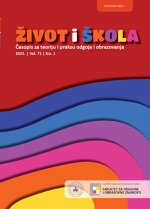TEACHERS’ ATTITUDES TOWARDS INCLUSIVE EDUCATION MEASURED BY THE MATIES SCALE
DOI:
https://doi.org/10.32903/zs.71.1.3Keywords:
teachersʼ attitudes, inclusive education, children with developmental disabilities, MATIES questionnaireAbstract
Inclusive education is a complex concept that involves the interplay of practice, culture, and policy, all of which shape inclusive practices through intricate interrelationships. Teachers, as the promoters of inclusive education, play a crucial role. Attitudes are a complex construct consisting of three components(cognitive, affective, and behavioral). Since attitudes are tendencies that can guide behavior, teachersare more likely to implement inclusive practices if they have positive attitudes. The research aimed to de-termine the metric characteristics and construct validity of the MATIES multidimensional scale on teachers’ attitudes towards inclusive education (IE) and to explore how teachers at primary schools in Croatia evaluate each of the three components of their attitudes towards IE. The study was conducted between May 1 and July 30, 2024, as a cross-sectional study of a probabilistic sample of 478 primary school teachers across Croatia (F = 445, M = 33) via an online questionnaire using the multidimensional MATIES scale. A four-point Likert scale was used, with descriptive indicators and t-tests set at 2.5 for a neutral stance. Confirmatory factor analysis confirmed the construct validity of the MATIES questionnaire. All three subscales showed high internal reliability. Teachers’ attitudes were generally positive (M = 2.60), and all three components of the attitude were also positively assessed: the cognitive component (M =2.60), the affective component (M = 2.96), and the behavioral component (M = 3.23). The behavioral component of attitude accounted for the largest percentage of variance, with 38.65%, followed by the affective component with 12.53% and the cognitive component with 9.65%. The translated and validated MATIES questionnaire exhibits satisfactory psychometric characteristics and is a reliable instrument that can be utilized in further research in its current form. The finding that teachers have positive attitudes toward inclusion should encourage inclusive policymakers to provide additional support to teachers in order to maintain teachersʼ positive attitudes.


